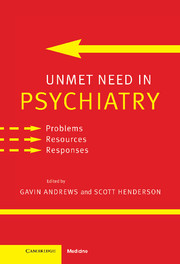Book contents
- Frontmatter
- Contents
- List of Contributors
- Preface
- Part I Unmet need: defining the problem
- Part II Unmet need: general problems and solutions
- Part III Unmet need: people with specific disorders
- Introduction
- 13 The unmet needs of people suffering from schizophrenia
- 14 The early course of schizophrenia: new concepts for early intervention
- 15 Unmet need in depression: varying perspectives on need
- 16 Unmet need following serious suicide attempt: follow-up of 302 individuals for 30 months
- 17 Met and unmet need for interventions in community cases with anxiety disorders
- 18 The unmet need for treatment in panic disorder and social phobia
- 19 Alcohol-use disorders: who should be treated and how?
- 20 Putting epidemiology and public health in needs assessment: drug dependence and beyond
- 21 Why are somatoform disorders so poorly recognized and treated?
- Part IV Unmet need: specific issues
- Part V Unmet need: conclusion
- Index
15 - Unmet need in depression: varying perspectives on need
from Part III - Unmet need: people with specific disorders
Published online by Cambridge University Press: 21 August 2009
- Frontmatter
- Contents
- List of Contributors
- Preface
- Part I Unmet need: defining the problem
- Part II Unmet need: general problems and solutions
- Part III Unmet need: people with specific disorders
- Introduction
- 13 The unmet needs of people suffering from schizophrenia
- 14 The early course of schizophrenia: new concepts for early intervention
- 15 Unmet need in depression: varying perspectives on need
- 16 Unmet need following serious suicide attempt: follow-up of 302 individuals for 30 months
- 17 Met and unmet need for interventions in community cases with anxiety disorders
- 18 The unmet need for treatment in panic disorder and social phobia
- 19 Alcohol-use disorders: who should be treated and how?
- 20 Putting epidemiology and public health in needs assessment: drug dependence and beyond
- 21 Why are somatoform disorders so poorly recognized and treated?
- Part IV Unmet need: specific issues
- Part V Unmet need: conclusion
- Index
Summary
Summary
Unmet need is examined from the perspectives of various stakeholders, including clinicians in primary and specialist care, depressed people and their families, fundholders and health planners, and society in general. The various perspectives lead to a number of needs which may conflict with one another, but not necessarily so. Areas of unmet need include: increasing the importance of depression in preventive programs; increasing education about the relapsing nature of depression, identifying underlying vulnerability to relapse and the importance of conveying such information in user-friendly formats; translating this information into practical programs that improve prevention, detection, and management; and identifying areas where there are unanswered questions requiring further research. Strategies aimed at increasing the quality of life and reducing risk factors for depression also improve health in general, are relatively cheap and are acceptable to the general public. Thus, they simultaneously address a number of crucial economic and social concerns.
Varying perspectives on need
Major depression is a common illness with a significant morbidity (Goering, Lin, Campbell, Boyle & Offord, 1996; Kessler, McGonagle, Schwartz, Blazer & Nelson, 1993; Regier et al., 1988). A depressive episode is associated with increased morbidity and mortality from a range of medical and other psychiatric disorders (Fawcett, 1993; Livingston Bruce, Leaf, Rozal, Florio & Hoff, 1994), and an increased functional and economic burden for depressed individuals, the health budget and society (Bushnell & Bowie, 1995; Murphy et al., 1991; Simon, Von Korff & Barlow, 1995). The significance of depression also recently received considerable public attention following the World Bank report (Murray & Lopez, 1996) that the toll, measured by disability-adjusted life years (DALYs), is currently fourth behind respiratory diseases, diarrheal diseases, and perinatal conditions.
- Type
- Chapter
- Information
- Unmet Need in PsychiatryProblems, Resources, Responses, pp. 233 - 244Publisher: Cambridge University PressPrint publication year: 2000
- 1
- Cited by

